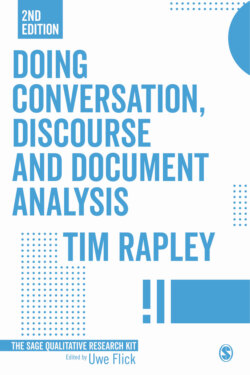Читать книгу Doing Conversation, Discourse and Document Analysis - Tim Rapley - Страница 11
На сайте Литреса книга снята с продажи.
Some introductory thoughts
ОглавлениеThe term ‘discourse analysis’ is often used to describe the style of work you will see in this book. Unfortunately for you, that term has many meanings. Some people take it to mean focusing on how some specific discourses, say ‘racism’ and ‘nationalism’, are used across a range of interview transcripts or a range of newspaper editorials. Others may take it to mean focusing on how specific words, like ‘the evidence suggests’ or ‘obviously’, are used in an audiotape of a conversation or a single scientific research article to argue a specific case. Irrespective of the approach, for those analyzing discourse the primary interest is in how language is used in certain contexts. And the context can range from a specific moment in a conversation to a specific historical period.
On a general level, people studying discourse see language as performative and functional: language is never treated as a neutral, transparent, means of communication. But rather than talk in the abstract, let me give you a ‘classic’ example: Two reporters see a man being shot. The next day one headline reads ‘Freedom Fighter Kills Politician’ and the other headline reads ‘Terrorist Kills Politician’. Some of the questions you could ask are:
Which one is true?
Which one is correct?
Which one is factual?
And this is not just a philosophical or abstract question. We have seen this being explored in our recent history through the debates about the status of the people moved from Afghanistan to the American enclave in Cuba and interned in Guantanamo Bay. One of the debates has centred on whether these people are to be understood as ‘prisoners of war’ – and therefore to have specific sets of legally binding human rights – or as ‘unlawful combatants’. Similarly, Pervez Musharraf, Pakistan’s tenth president, is one of many political leaders that have commented on the contemporary difficulties in defining just who is a ‘freedom fighter’ and who is a ‘terrorist’. So as these examples begin to show, language is constructive, it is constitutive of social life. As you speak and write you produce a world.
So the interest for those analyzing discourse is on how language is used. The focus is on what specific version of the world, or identity, or meaning is produced by describing something in just that way over another way; what is made available and what is excluded by describing something this way over an alternative way. I can offer you another classic, albeit more mundane, example. Note that the elements of the following list are all ‘true’, ‘correct’ and/or ‘facts’ about me:
I am old.
I am young.
I am a doctor.
I am not a doctor.
I was born on 10 August 1973.
I was born on 9 August 1973.
Let us take the simplest of these contrasting statements about me – the old/young dichotomy. Well, at some moments, with some people, I get referred to as ‘young’. For example, I taught some mature students and one of them entered the room late and refused to believe that someone my age could be the teacher; as she noted, ‘I was just too young’. And it is not hard to imagine other moments when I am classified as ‘old’. Am I too old to go clubbing? For me the feeling of ‘being too old’ is massively dependent on such factors as the other clubbers’ ages. So such categorizations can be dependent on such contextual factors as the age of the other people, the specific context or social norms.
If we think about the second pair on the list, as I work in a medical school, I am routinely reminded of my fluid and impermanent status as a ‘doctor’. At various moments I have been asked, ‘What kind of doctor are you?’. When I explain I have a PhD some people, most often medical practitioners, have been known to reply, ‘Oh, so you’re a PhD’. My mother has commented, albeit jokingly, that ‘You may be a doctor, but you’re not a useful one’. Also, when trying to recruit medical practitioners for research, to get access to them, I often tell the receptionist that I am ‘Doctor Tim Rapley’ as I know from experience that a plain ‘Tim Rapley’ will only get a message taken whereas the added descriptor will often get me put directly through to them. So how I choose to describe myself and how others describe me, can, and does, have effects.
Finally, the two references to my date of birth refer to two different documents that I possess. One is my birth certificate, which offers one of the dates; I recently discovered the other date when I saw a copy of my birth record that was completed by the midwife who oversaw my delivery. As I am adopted I have no way of knowing which date is ‘real’. However, the date on my birth certificate is orientated to by various institutions and institutional actors as having ‘a factual status’. In terms of my passport, tax forms, insurance policies, and so on, only one of the documents, only one of the dates, is relevant. However, in terms of my personal narrative, my identity as an ‘adoptee’, both documents are relevant. Documents produce specific realities and the realities they produce have effects.
So I can and do describe myself in a multitude of ways and others can and do describe me in different ways. I am a son, a partner, an academic, a researcher, an employee, a seminar leader, a patient, and so on. The point is to focus on which description, or to put it more technically, which identity, membership category or subject position, among the many, is relevant, the ‘work’ that it does, and how that is tied to specific contexts and connects to broader culture.
